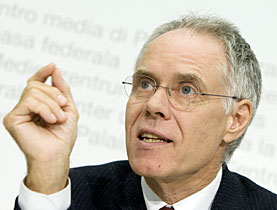Land “wasted” for fuel as millions go hungry

Far from being a miracle alternative energy solution, agrofuels are a dead end with disastrous consequences for developing countries, Swissaid has claimed.
Caroline Morel, director of the Swiss non-governmental organisation, says it is unacceptable that agricultural land in the developing world – where millions suffer from hunger – is being used to run cars.
“To fill the tank of a car with 95 litres of ethanol, 200 kilos of maize are needed – enough to feed a person for one year,” she explained at the launch of Swissaid’s campaign condemning the use of such fuel.
“From the point of view of energy and climate policy, agrofuels are an absurdity,” added Rudolf Rechsteiner, Swissaid’s president.
“Agrofuels are specifically wrong because they destroy the soil and put poor farmers in a position where they cannot afford to buy food,” he told swissinfo.
He said the result was higher prices for foodstuffs, poor people being displaced, deforestation and a strain on water resources.
The global demand for “green fuels” has been spurred on by the high targets set by the United States and the European Union for dependence on these sources. The vast majority of production will take place outside the US and EU.
Moratorium
Rechsteiner, who is also a member of parliament for the Swiss centre-left Social Democrats, launched a parliamentary initiative last October calling for a five-year moratorium on the importation of agrofuels to Switzerland.
“We should invest in renewable energy sources; agrofuels only create new problems,” he said.
Indian agricultural scientist Devinder Sharma, who attended the launch of the Swissaid campaign in Bern, said that 11 million hectares in his country were earmarked for jatropha cultivation destined for the production of biodiesel. That represents three times the surface area of Switzerland.
“While the poor go to bed hungry and more and more farmers are being driven out of agriculture, India is witnessing a flurry of initiatives to encourage large-scale plantations of argofuel crops, mainly jatropha,” Sharma said.
A Swiss moratorium would send an important message to export countries like India, where there is a conflict between food and fuel production, according to Sharma, who chairs the New Delhi-based collective, Forum for Biotechnology and Food Security.
“It would send a very clear political message that more and more people in Western countries acknowledge that agrofuels are not the right path to energy security. This would not only be symbolic but also curb our export potential,” he told swissinfo.
Losing land
Apart from the sustainability argument – there is not enough cultivable land on the planet to provide for current fuel consumption needs – Swissaid also points to the danger of land grabbing where famers have few legal rights.
Swissaid has firsthand experience of the impact of agrofuel crop production through its poverty reduction activities in Colombia.
More than one quarter of Colombia’s production of palm oil comes from the Sur de Bolívar region, where Swissaid supports a farmers organisation. In the village of Simiti, 2,600 hectares previously cultivated by small farmers have been converted to commercial oil-palm cultivation.
Large firms have acquired the rights to these lands for 30 years, partly because the farmers living there did not have legal title to the land they had worked for generations.
The situation is precarious for these families, even with the legal assistance of Swissaid, as they can no longer practice subsistence farming, and job prospects on the new plantations are limited.
“The Colombian government, which wants to sell biofuels to the European market, is promoting the cultivation of energy plants through subsidies and incentives,” Morel said.
A report by the Organisation for Economic Co-operation and Development concluded that biofuel production was costly and ineffective and had entered into direct competition with food production from day one.
Biofuels are fuels made from organic material or from the waste they produce. They should produce less greenhouse gas emissions than conventional transport fuels.
Agrofuels are biofuels that are produced from specific crops rather than through waste processes or recycling.
Burning the fuels releases carbon dioxide, but growing the plants absorbs a comparable amount of the gas from the atmosphere.
However, energy is used in farming and processing the crops, and this can make biofuels as polluting as petroleum-based fuels, depending on what is grown and how it is treated.
Production of ethanol doubled globally between 2000 and 2005, with biodiesel output quadrupling. Brazil leads the world in production and use, making about 16 billion litres per year of ethanol from its sugarcane industry.
According to recent figures, biofuels contributed 0.3% of total energy consumption in European Union countries in 2003, which rose to 2% in 2006.
The EU wants to source 10% of all petrol and diesel from biofuels by the end of 2020. The United States has set the same target.
Swissaid employs 79 people around the world – plus 32 in Bern and Lausanne.
It gave its support to 188 local projects in 2008, including eight in Switzerland.
Swissaid supports development work in India, Myanmar, Guineau Bissau, Niger, Tanzania, Chad, Ecuador, Colombia and Nicaragua.
Swissaid’s annual budget received a boost in 2008 with an increase of 38% in donations, bringing its total budget for the year to SFr19.1 million ($16.46), an increase of 25% on 2007.
Federal agencies contributed close to one third of Swissaid’s budget in 2008.

In compliance with the JTI standards
More: SWI swissinfo.ch certified by the Journalism Trust Initiative














You can find an overview of ongoing debates with our journalists here . Please join us!
If you want to start a conversation about a topic raised in this article or want to report factual errors, email us at english@swissinfo.ch.